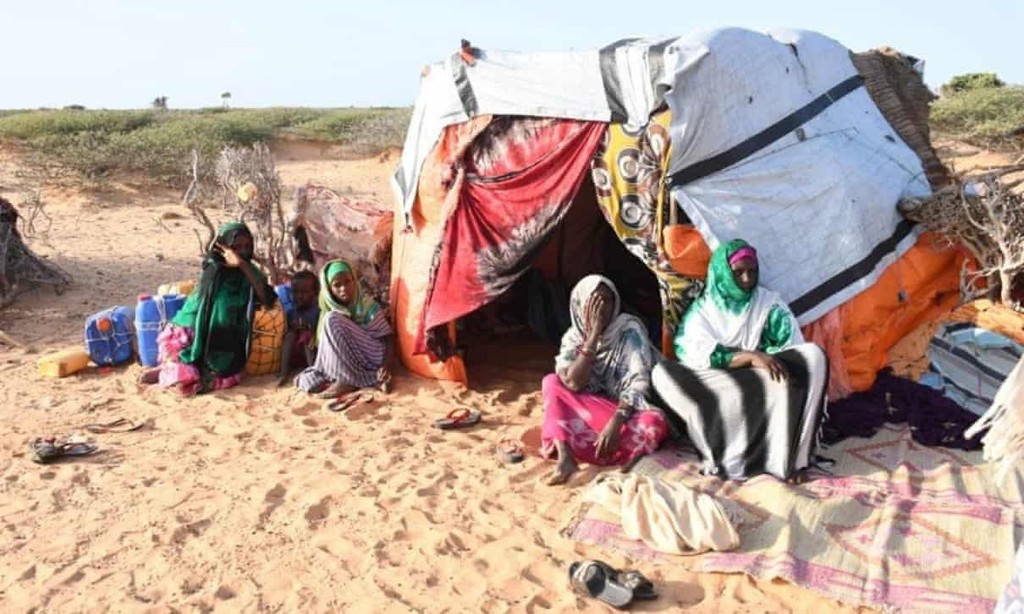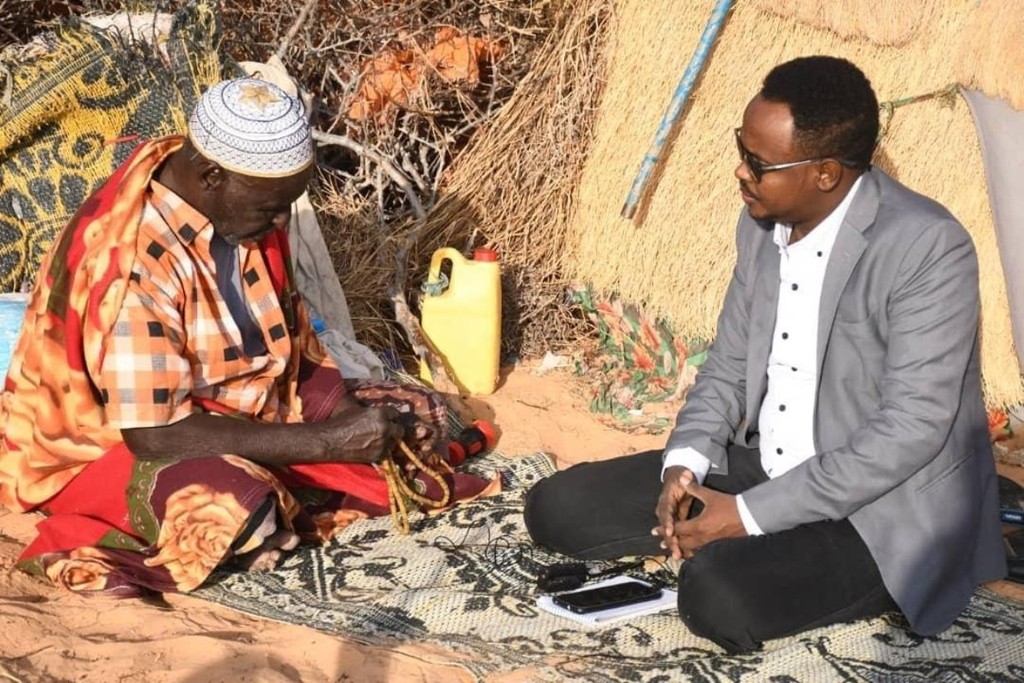
 Fartun’s family mourns her death. Photo: Global Media Campaign to End FGM
Fartun’s family mourns her death. Photo: Global Media Campaign to End FGM
A loss of life, especially when it is completely avoidable, stings different. Just a few weeks ago, Fartun Ahmed, a 13-year-old bled to death after undergoing female genital mutilation in Somalia. FGM is a violation that 200 million women and girls — according to UNICEF — survived and live with day in day out. There are different types of FGM, some more severe than others, but all equally traumatic with lifelong health consequences.
There has been some media coverage within Somalia and recently picked up by the likes of Guardian and the BBC. Photos of heartbroken parents in their traditional Somali homes emerged, followed by social media campaigns led by the Global Media Campaign and other anti-FGM campaigners. They were all expressing outrage and calling for action so that no more life is lost unnecessarily due to this brutal rite of passage which dictates that girls must be genitally mutilated to be seen as “clean,” “good,” “honorable,” or “marriageable.”

 Fartun’s father speaks to a journalist after his daughter’s death. Photo: Global Media Campaign to End FGM
Fartun’s father speaks to a journalist after his daughter’s death. Photo: Global Media Campaign to End FGM
As the old saying goes “a picture is worth a 1,000 words.” If one pays attention closely to Fartun’s family, their pain and their environment – the compounded, uncomfortable layers of truths that the media usually ignores becomes glaringly obvious. As preferences are placed to telling stories that already fit within certain familiar narratives about Somalia and FGM, instead of looking deeper and calling out the unfortunate circumstances and environments leading to Fartun’s death in the first place.
Fartun’s sister was also cut but luckily survived the mutilation. However, she may also be destined for a life not too dissimilar from her mother’s — a survivor of FGM, and uneducated, poor woman who is a second wife to a blind 80-year-old goat herder. This pastoralist family is a story of so many forgotten Somalis that have no access to medical or education facilities; living obliviously and unaffected by any national or international issues such as COVID-19.
FGM prevalence in Somalia is over 98 percent where the most severe form of FGM (Type 3) is known to be practiced. This statistic has been unchanged for years, and referenced widely in the media, by development agencies and CSOs working in Somalia. Another issue is that there are few available statistics on the violence and abuse faced by women and girls in Somalia.
Fartun’s family and other pastoralist communities perfectly fit the profile of beneficiaries that are supposed to benefit from FGM programming, campaigns, and funding. Yet the message is neither reaching this community nor are they included in program development for projects funded in their name or for their sake.
Similarly, the lack of political will to legislate against FGM is also another culprit, and government must now take some accountability for being negligent with the lives of women and girls. Fartun may have bled to death, but she died from neglect by patriarchal and racist systems run by people that are benefitting from these structures that frankly do not care or value her life, or the lives of other Somali girls. They use narratives that fit their world views of the black race by disenfranchising through “us” and “them” narratives or “good” and “bad” cultures modeled on western standards of civility and progress.
For FGM to truly end, a space for conversation that welcomes diverse opinions is required. We must listen to each other and speak truthfully without the threat of being “cancelled.” FGM must be dealt with broadly as an issue of bodily autonomy. Instead of dealing with FGM in isolation, we need an approach that addresses gender-based violence from an intersectional, multi-sectorial, intergovernmental, and local perspective. If there was a medical facility nearby, Fartun could have been saved. If roads were not treacherously unsafe, she could have been saved. If her parents were aware and educated that FGM is not an Islamic requirement she could have been saved. If they also understood the importance of girl education and had access to free education, their daughters may have had a brighter, more prosperous trajectory.
Somalia: Government must end medical negligence and prioritize anti-FGM laws
Fartun’s father speaks to a journalist after his daughter’s death. Photo: Global Media Campaign to End FGM
A loss of life, especially when it is completely avoidable, stings different. Just a few weeks ago, Fartun Ahmed, a 13-year-old bled to death after undergoing female genital mutilation in Somalia. FGM is a violation that 200 million women and girls — according to UNICEF — survived and live with day in day out. There are different types of FGM, some more severe than others, but all equally traumatic with lifelong health consequences.
There has been some media coverage within Somalia and recently picked up by the likes of Guardian and the BBC. Photos of heartbroken parents in their traditional Somali homes emerged, followed by social media campaigns led by the Global Media Campaign and other anti-FGM campaigners. They were all expressing outrage and calling for action so that no more life is lost unnecessarily due to this brutal rite of passage which dictates that girls must be genitally mutilated to be seen as “clean,” “good,” “honorable,” or “marriageable.”
As the old saying goes “a picture is worth a 1,000 words.” If one pays attention closely to Fartun’s family, their pain and their environment – the compounded, uncomfortable layers of truths that the media usually ignores becomes glaringly obvious. As preferences are placed to telling stories that already fit within certain familiar narratives about Somalia and FGM, instead of looking deeper and calling out the unfortunate circumstances and environments leading to Fartun’s death in the first place.
Fartun’s sister was also cut but luckily survived the mutilation. However, she may also be destined for a life not too dissimilar from her mother’s — a survivor of FGM, and uneducated, poor woman who is a second wife to a blind 80-year-old goat herder. This pastoralist family is a story of so many forgotten Somalis that have no access to medical or education facilities; living obliviously and unaffected by any national or international issues such as COVID-19.
FGM prevalence in Somalia is over 98 percent where the most severe form of FGM (Type 3) is known to be practiced. This statistic has been unchanged for years, and referenced widely in the media, by development agencies and CSOs working in Somalia. Another issue is that there are few available statistics on the violence and abuse faced by women and girls in Somalia.
Fartun’s family and other pastoralist communities perfectly fit the profile of beneficiaries that are supposed to benefit from FGM programming, campaigns, and funding. Yet the message is neither reaching this community nor are they included in program development for projects funded in their name or for their sake.
Similarly, the lack of political will to legislate against FGM is also another culprit, and government must now take some accountability for being negligent with the lives of women and girls. Fartun may have bled to death, but she died from neglect by patriarchal and racist systems run by people that are benefitting from these structures that frankly do not care or value her life, or the lives of other Somali girls. They use narratives that fit their world views of the black race by disenfranchising through “us” and “them” narratives or “good” and “bad” cultures modeled on western standards of civility and progress.
For FGM to truly end, a space for conversation that welcomes diverse opinions is required. We must listen to each other and speak truthfully without the threat of being “cancelled.” FGM must be dealt with broadly as an issue of bodily autonomy. Instead of dealing with FGM in isolation, we need an approach that addresses gender-based violence from an intersectional, multi-sectorial, intergovernmental, and local perspective. If there was a medical facility nearby, Fartun could have been saved. If roads were not treacherously unsafe, she could have been saved. If her parents were aware and educated that FGM is not an Islamic requirement she could have been saved. If they also understood the importance of girl education and had access to free education, their daughters may have had a brighter, more prosperous trajectory.
The Author
Naimah Hassan